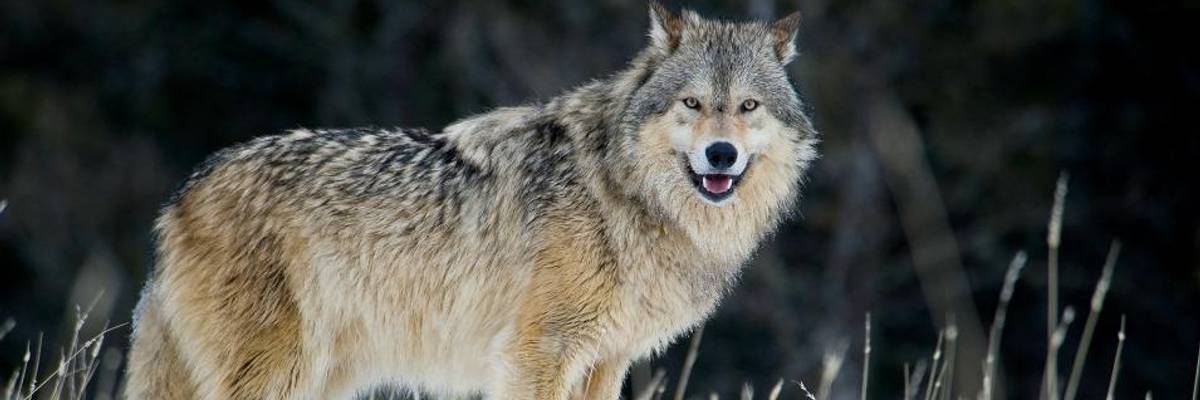
One measure included in the 2024 appropriations bills would strip most gray wolves of Endangered Species Act protections in the Lower 48 states.
Republicans Put US Species on 'Direct Path to Extinction' With Poison Pill Riders
A Center for Biological Diversity found 27 anti-wildlife measures in FY 2024 appropriations bills, the most since the Endangered Species Act was passed 50 years ago.
U.S. Lawmakers, mostly Republicans, have inserted a record number of anti-wildlife measures into the appropriations bills for fiscal year 2024, the Center for Biological Diversityreported Tuesday.
The attack comes despite the fact that scientists warn human activity may be triggering a sixth mass extinction, as species disappear at unprecedented rates. A September study found that vertebrate species groups are dying off at a rate 35 times higher than it would be without anthropogenic pressure.
"Republicans have weaponized the appropriations process to launch a full-blown assault on our natural heritage," Center for Biological Diversity senior policy specialist Stephanie Kurose said in a statement. "These heartless attacks would strip away lifesaving protections from our most imperiled creatures—from wolves to whales to freshwater mussels. If passed, these bills would put multiple species on a direct path to extinction."
"I hope the white-nose syndrome wipes all of them out," Rep. Ralph Norman (R-S.C.) said during a hearing in July. "We won't have to worry about it."
The center's report, titled Paving the Road to Extinction, found that 26 of the 27 "poison pill riders" placed in the appropriations bills were put there by Republicans. The last was introduced by Senate Democrats in an agreement to preserve preexisting measures. The total number of riders is more than Congress has added since the Endangered Species Act was passed 50 years ago.
"Republican members of Congress are trying to kill the Endangered Species Act," the center's endangered species program director Noah Greenwald posted on social media.
The report noted that Republican lawmakers have expressed outright hostility to the survival of endangered species. One rider, for example targeted the recent decision to list northern long-eared bats under the Endangered Species Act. The species has declined by 99% in 20 years due to white-nose syndrome, and human activity puts greater pressure on the survivors. But Rep. Michael Simpson (R-Idaho) added a rider barring any funding from enforcing those protections.
"I hope the white-nose syndrome wipes all of them out," Rep. Ralph Norman (R-S.C.) said during a hearing in July. "We won't have to worry about it."
Six of the measures—the most aimed at any one animal—targeted two critically endangered species of whales: Rice's whales and North Atlantic right whales. There are only around 50 Rice's whales left, and they live only in U.S. waters, while right whales are dying off so quickly they could be functionally extinct by 2040. Despite this, one rider would prevent the National Oceanic and Atmospheric Administration from finalizing a rule that would protect right whales from ship strikes, while another prohibits protections for Rice's whales from both ship strikes and oil and gas activity.
Another rider would effectively strip most gray wolves of Endangered Species Act protections in the Lower 48 states while a third would both end protections for Greater Yellowstone Ecosystem grizzly bears and prevent the courts from intervening.
The center noted that most anti-wildlife riders introduced in previous years were rejected before the bills passed. But it only takes a few to do real harm. To return to right whales, in 2022 Congress approved a measure that would postpone conservation efforts to protect the dwindling population from getting caught in fishing gear.
"With each successful rider, we're losing our ability to end extinction in the United States," Kurose said. "These attacks are deeply unpopular with the American public, who want to see our natural heritage protected for future generations to come."
An Urgent Message From Our Co-Founder
Dear Common Dreams reader, The U.S. is on a fast track to authoritarianism like nothing I've ever seen. Meanwhile, corporate news outlets are utterly capitulating to Trump, twisting their coverage to avoid drawing his ire while lining up to stuff cash in his pockets. That's why I believe that Common Dreams is doing the best and most consequential reporting that we've ever done. Our small but mighty team is a progressive reporting powerhouse, covering the news every day that the corporate media never will. Our mission has always been simple: To inform. To inspire. And to ignite change for the common good. Now here's the key piece that I want all our readers to understand: None of this would be possible without your financial support. That's not just some fundraising cliche. It's the absolute and literal truth. We don't accept corporate advertising and never will. We don't have a paywall because we don't think people should be blocked from critical news based on their ability to pay. Everything we do is funded by the donations of readers like you. Will you donate now to help power the nonprofit, independent reporting of Common Dreams? Thank you for being a vital member of our community. Together, we can keep independent journalism alive when it’s needed most. - Craig Brown, Co-founder |
U.S. Lawmakers, mostly Republicans, have inserted a record number of anti-wildlife measures into the appropriations bills for fiscal year 2024, the Center for Biological Diversityreported Tuesday.
The attack comes despite the fact that scientists warn human activity may be triggering a sixth mass extinction, as species disappear at unprecedented rates. A September study found that vertebrate species groups are dying off at a rate 35 times higher than it would be without anthropogenic pressure.
"Republicans have weaponized the appropriations process to launch a full-blown assault on our natural heritage," Center for Biological Diversity senior policy specialist Stephanie Kurose said in a statement. "These heartless attacks would strip away lifesaving protections from our most imperiled creatures—from wolves to whales to freshwater mussels. If passed, these bills would put multiple species on a direct path to extinction."
"I hope the white-nose syndrome wipes all of them out," Rep. Ralph Norman (R-S.C.) said during a hearing in July. "We won't have to worry about it."
The center's report, titled Paving the Road to Extinction, found that 26 of the 27 "poison pill riders" placed in the appropriations bills were put there by Republicans. The last was introduced by Senate Democrats in an agreement to preserve preexisting measures. The total number of riders is more than Congress has added since the Endangered Species Act was passed 50 years ago.
"Republican members of Congress are trying to kill the Endangered Species Act," the center's endangered species program director Noah Greenwald posted on social media.
The report noted that Republican lawmakers have expressed outright hostility to the survival of endangered species. One rider, for example targeted the recent decision to list northern long-eared bats under the Endangered Species Act. The species has declined by 99% in 20 years due to white-nose syndrome, and human activity puts greater pressure on the survivors. But Rep. Michael Simpson (R-Idaho) added a rider barring any funding from enforcing those protections.
"I hope the white-nose syndrome wipes all of them out," Rep. Ralph Norman (R-S.C.) said during a hearing in July. "We won't have to worry about it."
Six of the measures—the most aimed at any one animal—targeted two critically endangered species of whales: Rice's whales and North Atlantic right whales. There are only around 50 Rice's whales left, and they live only in U.S. waters, while right whales are dying off so quickly they could be functionally extinct by 2040. Despite this, one rider would prevent the National Oceanic and Atmospheric Administration from finalizing a rule that would protect right whales from ship strikes, while another prohibits protections for Rice's whales from both ship strikes and oil and gas activity.
Another rider would effectively strip most gray wolves of Endangered Species Act protections in the Lower 48 states while a third would both end protections for Greater Yellowstone Ecosystem grizzly bears and prevent the courts from intervening.
The center noted that most anti-wildlife riders introduced in previous years were rejected before the bills passed. But it only takes a few to do real harm. To return to right whales, in 2022 Congress approved a measure that would postpone conservation efforts to protect the dwindling population from getting caught in fishing gear.
"With each successful rider, we're losing our ability to end extinction in the United States," Kurose said. "These attacks are deeply unpopular with the American public, who want to see our natural heritage protected for future generations to come."
- With New Law, Conservationists Fear 'Uncontrolled Slaughter' of 90% of Gray Wolves in Idaho ›
- As Trump Rolls Back Barriers, Big-Game Hunters--Including Rich GOP Donors--Granted Dozens of Permits for Lion "Trophies" ›
- Opinion | We Know What’s Behind Biodiversity Loss—It’s Time to Actually Tackle It | Common Dreams ›
U.S. Lawmakers, mostly Republicans, have inserted a record number of anti-wildlife measures into the appropriations bills for fiscal year 2024, the Center for Biological Diversityreported Tuesday.
The attack comes despite the fact that scientists warn human activity may be triggering a sixth mass extinction, as species disappear at unprecedented rates. A September study found that vertebrate species groups are dying off at a rate 35 times higher than it would be without anthropogenic pressure.
"Republicans have weaponized the appropriations process to launch a full-blown assault on our natural heritage," Center for Biological Diversity senior policy specialist Stephanie Kurose said in a statement. "These heartless attacks would strip away lifesaving protections from our most imperiled creatures—from wolves to whales to freshwater mussels. If passed, these bills would put multiple species on a direct path to extinction."
"I hope the white-nose syndrome wipes all of them out," Rep. Ralph Norman (R-S.C.) said during a hearing in July. "We won't have to worry about it."
The center's report, titled Paving the Road to Extinction, found that 26 of the 27 "poison pill riders" placed in the appropriations bills were put there by Republicans. The last was introduced by Senate Democrats in an agreement to preserve preexisting measures. The total number of riders is more than Congress has added since the Endangered Species Act was passed 50 years ago.
"Republican members of Congress are trying to kill the Endangered Species Act," the center's endangered species program director Noah Greenwald posted on social media.
The report noted that Republican lawmakers have expressed outright hostility to the survival of endangered species. One rider, for example targeted the recent decision to list northern long-eared bats under the Endangered Species Act. The species has declined by 99% in 20 years due to white-nose syndrome, and human activity puts greater pressure on the survivors. But Rep. Michael Simpson (R-Idaho) added a rider barring any funding from enforcing those protections.
"I hope the white-nose syndrome wipes all of them out," Rep. Ralph Norman (R-S.C.) said during a hearing in July. "We won't have to worry about it."
Six of the measures—the most aimed at any one animal—targeted two critically endangered species of whales: Rice's whales and North Atlantic right whales. There are only around 50 Rice's whales left, and they live only in U.S. waters, while right whales are dying off so quickly they could be functionally extinct by 2040. Despite this, one rider would prevent the National Oceanic and Atmospheric Administration from finalizing a rule that would protect right whales from ship strikes, while another prohibits protections for Rice's whales from both ship strikes and oil and gas activity.
Another rider would effectively strip most gray wolves of Endangered Species Act protections in the Lower 48 states while a third would both end protections for Greater Yellowstone Ecosystem grizzly bears and prevent the courts from intervening.
The center noted that most anti-wildlife riders introduced in previous years were rejected before the bills passed. But it only takes a few to do real harm. To return to right whales, in 2022 Congress approved a measure that would postpone conservation efforts to protect the dwindling population from getting caught in fishing gear.
"With each successful rider, we're losing our ability to end extinction in the United States," Kurose said. "These attacks are deeply unpopular with the American public, who want to see our natural heritage protected for future generations to come."
- With New Law, Conservationists Fear 'Uncontrolled Slaughter' of 90% of Gray Wolves in Idaho ›
- As Trump Rolls Back Barriers, Big-Game Hunters--Including Rich GOP Donors--Granted Dozens of Permits for Lion "Trophies" ›
- Opinion | We Know What’s Behind Biodiversity Loss—It’s Time to Actually Tackle It | Common Dreams ›

